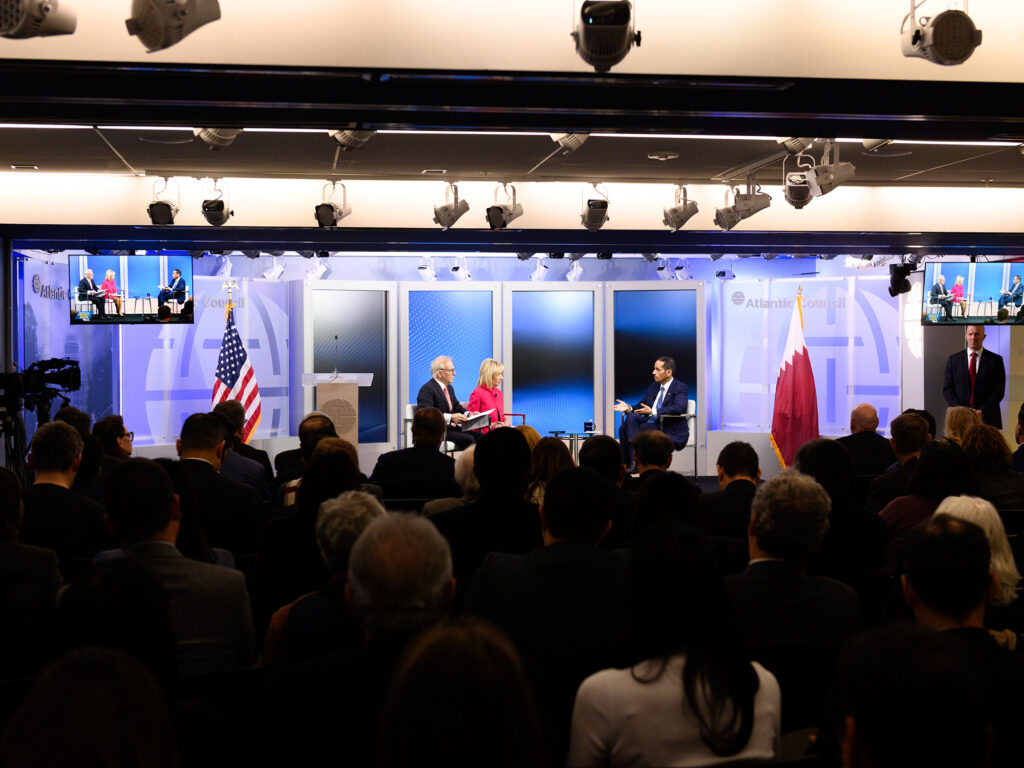The Qatari PM expressed concerns about Israel’s assault potentially escalating regional tensions and even starting a regional war.
The Prime Minister of Qatar, Sheikh Mohammed bin Abdulrahman Al Thani, has indicated that considerable progress is being made in the discussions between Israel and Hamas, noting that a plan to cease Israeli assault on Gaza and the exchange of captives has been communicated to Hamas.
In a detailed interview with the Atlantic Council, the Qatari PM also expressed concerns about the Israeli assault’s potential to escalate regional tensions and even start a regional war.
He emphasised the dire humanitarian situation in Gaza and criticised Israel’s use of aid as a political tool. He also clarified Qatar’s role in hosting Hamas leaders, which he says was coordinated with the U.S. to facilitate dialogue.
Potential new Gaza deal
The Prime Minister highlighted the progress made in recent talks in Paris, involving representatives from Egypt, Israel, and the United States.
A significant aspect of these discussions was the proposed phased truce, starting with the release of women and children, and the provision of humanitarian aid to Gaza.
In the initial stage of the agreement, a 30-day cessation will be observed for the release of the captives. Concurrently, discussions will be held to outline the next stage, involving an additional 30-day halt to facilitate the release of Israeli servicemen and male captives.
The Qatari PM underscored that this new approach marked a departure from Hamas’s earlier demand for a permanent ceasefire before any negotiations could take place. He believes that this shift indicates a potential breakthrough in the longstanding impasse, opening the door for further constructive dialogue.
“I believe we moved from that place to a place that potentially might lead to a ceasefire permanently in the future,” he said.
He emphasised Qatar’s role as a mediator, stressing the complexity of the situation and the need for a solution that addresses both the humanitarian crisis in Gaza and the release of captives.
He expressed cautious optimism about the new proposal being accepted by Hamas, indicating a potential de-escalation.
The Prime Minister also acknowledged the challenges in reaching a sustainable solution. He said that the situation remains delicate, with various factors at play, including the demands of the captives’ families, and the stance of the Israeli government that expressed its rejection of a two-state solution, which Qatar advocates for.
But Al Thani added that talks are “in a much better place than where we were a few weeks ago.”
Regional escalation fears
In response to the drone strike in Jordan, which elicited a promise of retaliation from Washington, Al-Thani expressed his hope that such retaliation would not undermine the ongoing negotiation process. However, he acknowledged that it is likely to significantly affect regional security.
“…We have seen what happened yesterday with the attack killing the Americans, it was a result of trying to do some operations here and there to undermine the regional security or to show some pressure, yet it resulted in the killing of three soldiers.”
Al-Thani disclosed that Qatar has been actively engaging in continuous discussions with Iran regarding the developments across the region.
He mentioned that Doha has been urging Tehran to leverage its influence with various regional actors to reduce tensions, including in the Red Sea area, where Houthis have been targeting ships and disrupting trade.
“About the Houthis, what’s happening…in the Red Sea, it’s something affecting all of us, freedom of navigation is something very important for my country for the entire region and the world, and it’s something unacceptable to be messed with.”
The Houthis in Yemen announced at the start of Israel’s brutal war on Gaza that they will be targeting vessels bound for Israel in the southern Red Sea and that they will stop once the Israeli genocide in Gaza stops.
Qatar-Hamas relations
In response to claims by Netanyahu about Qatar’s influence over Hamas, the Prime Minister of Qatar stated that Qatar isn’t a superpower capable of imposing its will on any party.
“I think that [Hamas leadership] living in Qatar is always being taken out of context, Qatar had the Hamas political office for almost 11 years. It happened in full coordination with the U.S. to establish communication channels… it’s proven to be effective.”
He highlighted that Qatar’s role is more about using its diplomatic channels to build bridges and create alternative solutions.
This approach, he noted, has been effective in previous mediation efforts. He also mentioned that Doha serves as the location for Hamas’s political office and is where senior political official Ismail Haniyeh resides.
“We are using our good offices to connect, bridge gaps, to come up with some alternatives. And this way has worked,” he explained, underscoring Qatar’s mediating role.
UNRWA and aid
In Gaza, hundreds of thousands are now refugees in their land, desperately clinging to inadequate aid.
The situation teeters on the brink of a humanitarian catastrophe, exacerbated by the escalating rift between Israel and the United Nations Relief and Works Agency (UNRWA), threatening to plunge the region into deeper crisis.
In response to allegations against UNRWA staff and subsequent funding cuts by Western countries, the PM stressed the vital role of UNRWA in aiding Palestinians.
He underscored the need for investigation, asserting, “It’s the only agency that can provide help and aid for the Palestinians,” and cautioned against collective punishment.
“These claims [need] to be investigated, but [UNRWA] cannot be punished because of the [acts] of some employees.”
Addressing the use of humanitarian aid in Gaza, he stated, “People in Gaza are dying from starvation,” highlighting the dire situation in even the so-called safe zones.
When asked whether Israel agreed in Paris to accelerate aid deliveries, the Prime Minister cautioned that humanitarian aid shouldn’t be used as a “bargaining chip” in negotiations.







